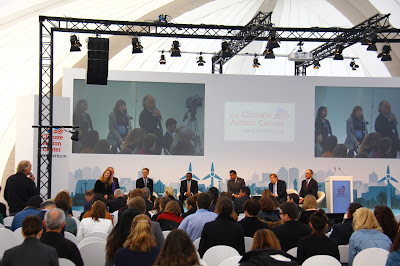The Room Where It Happened
Posted by: Anna McGinn
To get in the right mindset
for this post, I refer you to a song that has been stuck in my head for the
past two weeks-- Hamilton's The
Room Where it Happens.
Now that you have listened
to that, imagine me waiting outside a negotiating room to see if they will let
me, an observer, into the room. Lin-Manuel Miranda's line runs through my head, "I…. wanna be in the room
where it happens, the room where it happens."
During the second week at
COP, the urgency to bring agenda items to some form of conclusion is
heightened, and as a result more and more meetings are closed to observers
(people who are not part of country delegations).
As Will described in his
post, What
stocktake are we talking about?, the
countries decide that instead of the standard "informal
consultations" on a subject matter, they will have informal informal
consultations which means that they will meet with the facilitators in a
session where they can hash out the disagreements between countries with less
formalities. On Monday afternoon, one of the negotiation streams I was
following announced an informal informal informal consultation (yes, you read
that right, three "informals"). This is when the facilitators of the
negotiating stream are not even in the room, and some country representatives
alone gather to make decisions on the text of decision.
In addition to these
announced session, as I walk through the halls of the conference center this
week, I see deals happening all around me from the women's bathroom to the
whispers around lunch tables, to the moments before and after official sessions
when different countries huddle together for last minute confirmations of positions.
It is fair to say that this is really "the art of the trade and where the
sausage is made."
On Tuesday morning, it was
clear that at least some negotiators had worked throughout the night in these
closed meetings to come to some conclusions because draft conclusion were on
the table that were not agreed upon in the meeting I had attended just the day
before.
 |
| During open negotiations countries usually just speak from their seats, but occasionally they express the need to get in a huddle to made a decision. |
Transparency is now
embedded in the Paris Agreement. Countries have many angles of transparency to
be considering during and between these negotiations. It is not only about
transparency in tracking progress toward emissions and adaptation goals, but it
should also be about transparency in the process. Holding countries to this
spirit of transparency has evolved to be one important role of some observer
groups here at the COP.
While Lin-Manuel Miranda’s Aaron
Burr expresses his frustration at not being in the room during formative
decisions about the creation of the United States,
“No one really knows how
the game is played,
The art of the trade,
How the sausage is
made.
We just assume that it
happens,
No one else is in the room
where it happens.”
We strive to comprehend how
the game is played and to interrogate the process to understand how it is
effective, when it is inclusive, and the ways in which decisions get made and
move forward to implementation. We can only do this when we are, in the room
where it happens.
And just to extend this
Hamilton reference even a bit further, a number of negotiating sessions at
the COP are ticketed meaning that observers can attend, but only if they get a
ticket from the focal point of their constituency group. For us, that means we
need to get a ticket from the head of the Research and Independent NGO (RINGO)
group. There were often very few tickets
for many interested people, so all kinds of lotteries and creative processes
ensued. One morning a fellow RINGO leaned over to me and said, “gosh, these
tickets might be harder to get than Hamilton ticket!” So, there you have it.



Love it, great post Anna!
ReplyDelete